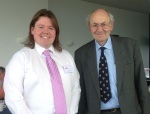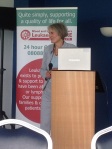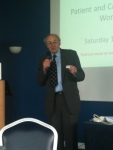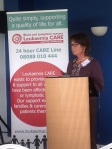March 20, 2015
Kris Griffin
info
blood cancer, cancer drugs fund, chronic myeloid leukaemia, cml patients, general election, health, Iclusig, insurance companies, kris griffin, life insurance cover, Lord Avebury, Mark Tami MP, nice, ponatinib, research, science, treatment, tyrosine kinase inhibitors
I met with parliamentarians yesterday to ask for their support in helping chronic myeloid leukaemia patients access vital, life extending medicines and life insurance. Overall it was a very productive day.
The meetings, held with Mark Tami MP and Lord Avebury, provided an opportunity for me to highlight the fact that patients in England currently are missing out on innovative new drugs whilst patients in Wales have full access. I also explained the difficulties CML patients have getting life insurance cover.
New drugs such as ponatinib (Iclusig®) have the potential to offer patients another treatment option when others have failed and when the only option for many is a stem cell transplant. The system for appraising drugs in England, NICE, says that there are too few patients for them to even consider making ponatinib available on the NHS, they won’t even look at the figures. It doesn’t seem fair that across the border in Wales all patients can be prescribed the drug when here it’s not going to be looked at.
Both parliamentarians were also supportive of my bid to get insurance companies to offer CML patients life insurance, as many of us are being turned down. We’re not asking the insurers to pay out on CML related deaths, but many patients can’t get mortgages without life insurance, so it’s vital that we can be accepted with exclusions for our condition.
There’s plenty of follow up work to be done: letter writing and tabling of parliamentary questions before purdah, the pre-election period in the United Kingdom. I’ll also be meeting up with my local MP Mark Garnier, who has been incredibly supportive over the years, next week to ask for his support on both matters.
Once the dust settles on the general election in May, I’ll be going back down to Westminster to gather more support from MPs and peers. The landscape will be a little calmer by then (I hope) and we’ll put even more pressure on the insurance industry and NICE to give CML patients the access to drugs and services that we deserve. Yesterday was a great start.
This slideshow requires JavaScript.
51.500175
-0.133233
February 22, 2015
Kris Griffin
info
blood cancer, cancer drugs fund, chronic myeloid leukaemia, cml, health, leukemia, medicine, National Institute for Health and Care Excellence, nice, research, science, Sir Andrew Dillon, treatment, University of York
I’ve been highly critical of NICE (National Institute for Health and Care Excellence) in the past but I’ll give credit where it’s due. In this BBC report University of York researchers suggest the Cancer Drugs Fund (CDF) is particularly poor value, diverting money from other patient services. They argue the drugs advice body, NICE, has set its price threshold too high.
Researchers at York say the funding level should be closer to £13,000 to provide the most benefit across the NHS instead of a £20,000 to £30,000 limit that NICE currently work with. Thankfully Sir Andrew Dillon, chief executive of NICE, said: “Unless you think that drug companies will be prepared to lower their prices in an unprecedented way, using a threshold of £13,000 per QALY would mean the NHS closing the door on most new treatments.” I applaud his position on this occasion.
What the researchers at the University of York have failed to take into account is the cost to develop a drug can run to hundreds of millions of pounds and someone has to pay for this. I’m not a defender of pharma and I still believe pharma should do more to make drugs more affordable but this type of scaremongering is unhelpful. We need to work with pharma and not impose dangerous limits on treatment. Readers of this blog will know that the new CML treatments which cost much more than £13,000 per year are, essentially, curing people with Chronic Myeloid Leukaemia. Who knows where these advances will take us, impose limits and we halt progress.
I need to read the report in its entirety but from this overview it appears the conclusions from York aren’t helpful, aren’t clever and don’t take into account the future of cancer treatment. Their recommendations would mean people would die. Perhaps if someone from York is reading this they would get in touch, perhaps we could meet up and perhaps they could tell me just how much my life is worth. I’d also like to ask them what price they put on a cure for cancer and if their report took this into account?
Kris Griffin
Access CML Drugs
BBC Health: NICE ‘sets price too high for NHS medicines’
January 15, 2015
Kris Griffin
info
ariad, blood cancer, chronic myeloid leukaemia, chronic myeloid leukemia, cml, cytogenetic response, health, new drugs, ponatinib, research, science, TKI, treatment
I’ve attached a pdf poster that outlines a national study on ponatinib and reports on the efficacy in patients failing multiple TKIs.
The conclusions were:
- Ponatinib has confirmed efficacy in a group of heavily pre-treated patients with CML.
- The probability of achieving cytogenetic response (CCyR) on ponatinib is greater in younger patients, those with prior CCyR and those without early haematological toxicity, confirmed on multivariate analyses (data not shown).
- Event free survival is higher in patients who received fewer TKI prior to treatment with ponatinib.
It makes for interesting study. For reasons of transparency this has been shared with me by an organisation who are working with ARIAD (who manufacture ponatinib).
Thanks, Kris
Download the PDF poster here.
52.388596
-2.249684
September 22, 2013
Kris Griffin
info
blood cancer, cancer, chronic myelogenous leukemia, chronic myeloid leukaemia, chronic myeloid leukemia, cml, cml patients, cure, cytarabine, dasatinib, drugs, European Journal of Cancer, Haemato-Oncology, health, imatinib, Imatinib Discontinuation, medicine, molecular responses, nilotinib, patients, research, science, treatment, tyrosine kinase inhibitors
More positive news on World CML day – we need to keep working towards a cure. K
Trial Suggests Imatinib Discontinuation Safe, Some Responses Persist
Evidence continues to mount that discontinuing imatinib treatment for chronic myeloid leukemia (CML) in the chronic phase is safe. A new phase II Dutch and Belgian study showed only about two-thirds of patients relapsed after discontinuing treatment with imatinib and cytarabine, and all patients remained sensitive to imatinib after relapse.
Tyrosine kinase inhibitors including imatinib have revolutionized CML treatment in recent years, but the need to continue treatment indefinitely is limiting. Several recent studies have begun to suggest that alternate treatment schedules or discontinuation of therapy are feasible among patients with good molecular responses. In a study of the Dutch-Belgian Cooperative Trial for Haemato-Oncology, researchers led by Noortje Thielen, of the VU Medical Center in Amsterdam, 33 patients with a molecular response lasting at least 2 years on imatinib and cytarabine combination therapy were randomized to either continue (18 patients) or cease (15 patients) imatinib treatment. Results were published online ahead of print in July in the European Journal of Cancer.
After a median follow-up period of 36 months, three patients randomized to continue treatment (17%) and 10 patients in the discontinuation arm (67%) had a molecular relapse; all three of the former patients had stopped imatinib treatment after randomization.
The molecular relapse rate at 12 months was 0% in the continued therapy group and 53% in the discontinuation group; at 24 months, those rates were 6% and 67%. In an as-treated analysis (accounting for the patients who ceased treatment in spite of randomization to continue imatinib), the two-year rate was 61% for discontinued therapy and 0% for continued imatinib.
The five patients in the discontinuation group who did not relapse showed a stable molecular response. The 13 patients who relapsed all regained molecular response after a median of 6 months from the restart of imatinib or nilotinib treatment.
“To our knowledge, this is the first randomized trial regarding the discontinuation of imatinib in first chronic phase CML patients who have achieved a durable and stable molecular response,” the authors wrote. “Our results are encouraging.” They noted that the addition of cytarabine to the initial regimen may have contributed to the persistence of response after therapy discontinuation, but that remains unclear.
Further studies on this issue will need to define predictive factors for successful discontinuation of imatinib, as well as of other TKIs including nilotinib and dasatinib, the researchers wrote. “Although imatinib treatment was previously expected to be life-long, our data suggest that, under close PCR monitoring, discontinuation of imatinib is safe in CML patients with a long-lasting molecular response,” they concluded.
http://www.cancernetwork.com/chronic-myeloid-leukemia/content/article/10165/2157668
September 9, 2013
Kris Griffin
action
blood cancer, cancer drugs, cancer drugs fund, cancer drugs survey, cdf, chronic myeloid leukaemia, clinical trial, cml, drugs, health, leukaemia, leukaemia and lymphoma research, lymphoma research, medicine, NHS England, patient, research, science, treatment, uk
Sharing this from Leukaemia and Lymphoma Research. K
CANCER DRUGS FUND SURVEY
The Cancer Drugs Fund has been in the papers a lot recently as its future after 2014 is uncertain. Established in 2010, it provides £200m each year to enable patients with cancer in England to access drugs that are not routinely funded by their local NHS.
As the leading UK blood cancer research charity we want to ensure the needs of blood cancer patients are being heard by decision makers.
This short survey will help us gain insights into the impact of Cancer Drugs Fund on the blood cancer community and will inform our policy position on access to medicines, new treatments and clinical trials for blood cancer patients.
The Cancer Drugs Fund (CDF) applies to patients eligible for NHS services in England so the survey is therefore aimed at blood cancer patients, their carers and families, and clinicians based in England only. For more information on the Fund please visit NHS England website.
The survey is anonymous and will take no more than 5 minutes to complete.
Your input is important to us so thanks in advance for your time and help with this!
https://leukaemialymphomaresearch.org.uk/form/cancer-drugs-fund-survey
August 7, 2013
Kris Griffin
action
All Party Parliamentary Group on Cancer, APPGC, blood cancer, cancer, consultation, government, health community, leukaemia, leukemia, macmillan, NHS England, parliament, politics, research, science
Just wanted to drop this link in to a very important consultation:
The All Party Parliamentary Group on Cancer (APPGC) is seeking the views of the cancer and wider health community about what should be the cancer priorities of each of the five new NHS England ‘domains’. And we want to hear your views. Respond to the consultation.
http://www.macmillan.org.uk/GetInvolved/APPG/Cancer-Priorities-Consultation.aspx#Takepart
Thanks,
Kris
August 7, 2013
Kris Griffin
info
blood cancer, chronic myeloid leukaemia, cost, drug approval, ECHOUTCOME, health technology assessment, leukaemia, leukemia, medical outcomes, medicine, nice, politics, QALY, research, science, treatment
Sorry about the break in service, I’ll start back with some older news but well-worth documenting here nonetheless. It does back to the argument for personalised treatment once again. Kris
Nice’s drug-approval formula is flawed, warn researchers
The method used to assess which drugs should be recommended for widespread use on the NHS is “flawed”, researchers have said.
The formula used by the National Institute for Health and Clinical Excellence (Nice) should be scrapped, according to the authors of a European Commission-funded study.
The method, called quality-adjusted life years (QALY), fails to reflect personal differences about medical outcomes, they said.
The QALY method is used to assess the value of new drugs for patients in England and Wales. The method involves looking at the cost of using a drug for a year and weighs it against how much someone’s life can be extended and improved.
The authors of the report, who present their findings at a conference in Brussels today, surveyed 1,300 people across the UK, Belgium, France and Italy about the way they rate different medical outcomes.
The responses varied “hugely”, the European Consortium in Healthcare Outcomes and Cost-Benefit research (ECHOUTCOME) team said, adding: “The way people rate different medical outcomes is personal, and cannot be summed up by a neat formula.”
Some of the foundations of the formula were scrutinised. For instance, the assumption that someone who prefers 10 years of healthy life to five years, will also prefer 10 years in a wheelchair to five years, did not always reflect the views of those surveyed.
Project leader Ariel Beresniak said: “The research provides robust scientific evidence that QALYs produce hugely inconsistent, wrong results, on which important decisions are being made.
“Agencies such as Nice should abandon QALY in favour of other approaches. European Health Technology Assessment agencies currently looking to adopt the Nice model must seriously reconsider.”
Gerard Duru, emeritus research director in mathematics at the French National Centre of Scientific Research, said: “The underlying assumptions of the QALY outcome are very theoretical and are not verified in a real population.
“The QALY indicator is not a valid scientific scale. It is impossible to know what we are measuring, and therefore impossible to base a formula upon it.”
A Nice spokeswoman said the study was “rather limited”.
She said: “When we want to find out whether a new treatment provides more for patients than current practice, and whether any improvement in quality or length of life justifies the price the NHS is asked to pay for it, we need to use a measure that can be applied fairly across all diseases and conditions.
“The QALY is the best measure anyone has yet devised to enable us to do this.
“Economists will argue about the precision of the QALY methods and it’s not perfect. But it’s based on solid research and uses a way of measuring how quality of life changes when using different treatments, which is the best we have available.
“It’s developing and improving all the time and the criticisms in this, rather limited, study haven’t shaken our confidence in its value to Nice in helping make decisions on the best way to use new and sometimes very expensive drugs and other health technologies.
“QALYs only help to inform decisions about what the NHS should provide. The final decisions are taken by people who work in the NHS, informed by the views of patients, manufacturers and academics.”
ELLA PICKOVER FRIDAY 25 JANUARY 2013
http://www.independent.co.uk/life-style/health-and-families/health-news/nices-drugapproval-formula-is-flawed-warn-researchers-8466904.html
June 17, 2013
Kris Griffin
info
acute lymphoblastic leukaemia, ALL, babies, blood cancer patients, cancer, chemotherapy, chronic myeloid leukaemia, clinical nurse specialist, clinical psychologist, cml, cml patients, conference, dasatinib, Doctor Richard Taylor, drugs, facebook, fertility, health, imatinib, Institute of Cancer Research, Leukaemia Care Patient and Carer Conference, medicine, National Health Action Party, nhs, politics, public speaking, science, sperm banking, treatment, worcester
Yesterday was the Leukaemia Care Patient and Carer Conference held at Worcester Rugby Club. Anyone who reads this blog will know how fond I am of Leukaemia Care and the event was tackled with the usual friendly, welcoming attitude we’ve come to expect from the family. Doctor Richard Taylor, independent member of Parliament for Wyre Forest between 2001 and 2010 and co-Leader of National Health Action Party, facilitated the day. As President of Leukaemia Care he was the perfect choice to ensure the day ran to time and bring order to discussions.
The day started with a presentation on ALL (acute lymphoblastic leukaemia) from Monica Else, a senior scientific officer from the Institute of Cancer Research. Monica’s husband, a patient,also attended and they provided a fantastic insight into how the science translates into real life. This was followed by the inspiring Lisa Nelson who, although enduring two transplants, brought optimism and courage to the stage. Tuney Thomas, a clinical nurse specialist from Worcestershire Royal Hospital spoke about chemotherapy and cut through the science and rumour with panache. Deborah Alsina, CEO of Bowel Cancer UK, spoke from a carer’s perspective as her husband has leukaemia. Their story of imatinib, dasatinib and babies struck a chord with me and it has been a long while since I have been captured by a speaker so much. I’m not sure anyone in the room wanted her to stop.
After a very tasty lunch break with the opportunity to catch up with old friends and new, we headed into breakout sessions on clinical trials and benefit advice. John Donohue, a charted clinical psychologist from Russells Hall Hospital, spoke in-depth about the psychological and emotional experiences of blood cancer patients. This was a difficult one, a very divisive subject and John handled questions and wide-ranging topics carefully and with care.
Then it was my turn. I thoroughly enjoy spending time, talking and sharing my experiences with an audience, it’s a very liberating and cathartic thing for me. This was also the first time, against advice, I spoke about sperm banking and fertility treatment. Without it I wouldn’t be a Dad; it is so important for the cancer patient. I’d like to think the delegates felt comfortable, well they laughed in all the right places, although I’m not sure they’ll ever hear a bell ringing the same way again. The day finished with a panel discussion, which I was part of. Lots of questioning and a fascinating discussion about the part Facebook plays in the care network. My good friend Nigel Deekes was in attendance and delivered some impromptu and informative words about the subject.
What struck me from the day was that Leukaemia Care really do care, they are a fantastic national charity who have great potential to make lives better. Controversially, perhaps, I did challenge them to bring more young people into the fold. I don’t think there was a delegate under the age of 25. Without young people, who are sadly the next generation of patients, I fear for any charity. The challenge was accepted with eager vigour as I expected. I can’t wait for the next conference.
I left brimming with new ideas, watch this space, and inspired by stories of courage and care. The Leukaemia Care team deserve a huge pat on the back for delivering a fantastic event and if anyone can tell me a better way to spend a Saturday I’d like to hear it.
www.leaukaemiacare.org.uk
-

-
Kris Griffin and Doctor Richard Taylor
-

-
Monica Else
-

-
Doctor Richard Taylor
-

-
Lisa Nelson
May 27, 2013
Kris Griffin
info
android, app, blood cancer, cancer, chronic myelogenous leukaemia, CML monitor, disease, health, internet, ios, leukemia, Medivo, mobile app, patient, science, technology, track BCR-ABL
Just wanted to highlight this. I’m not endorsing it, because I haven’t used it, but I though readers may find it interesting…
CML Monitor Provides Innovative Method for Tracking Symptoms and Monitoring BCR-ABL Lab Test Results for Physicians and People Living with CML.
Medivo Inc., a health monitoring platform that regularly connects doctors, consumers and clinical labs, announced the launch of CML Monitor, a free mobile app for people living with chronic myelogenous (or myeloid) leukemia (CML).
This new app simplifies daily life for people living with CML by providing them an innovative way to easily and accurately track BCR-ABL laboratory testing results and symptoms while delivering reports to their physicians for optimizing treatment.
CML Monitor is available for iOS and Android devices. Watch a video or download the app here. (www.medivo.com/cml/)
The app provides testing reminders and also enables people living with CML to connect with participating physicians, who receive regular patient updates to make better-informed treatment decisions. Additional features include noting questions for doctors, documenting hospitalizations, creating custom symptoms and socializing with others living with CML.
“Monitoring disease response to therapy is one of the key requests of people living with CML,” said Dr. Jason Bhan, EVP and Co-Founder of Medivo. “With this new app, Medivo is able to help consumers track their progress and also help physicians more closely monitor response to therapy and changes in condition symptoms.”
The new CML Monitor app builds upon the success Medivo has achieved with its popular GI Monitor app, the leading mobile disease monitoring application for people living with IBD, and HAE Monitor app, which allows people with hereditary angioedema to easily track symptoms and deliver reports to their physicians.
CML, also known as chronic myelogenous leukemia, is a type of cancer that begins in the blood-forming cells of the bone marrow. It can move into the blood and subsequently spread to other parts of the body. The term “myelogenous” in CML refers to the type of cells affected by this cancer, which typically affects older adults.
Source: Medivo
http://www.medicexchange.com/news-article/medivo-launches-free-mobile-app-for-monitoring-chronic-myeloid-leukemia-cml.html
May 10, 2013
Kris Griffin
info
accesscmldrugs, blood cancer, cancer drug fund, chronic myeloid leukaemia, cml, cml patients, complete molecular remission, current-events, dasatinib, health, imatinib, kris griffin, labour party, leukemia, major molecular remission, medicine, nhs, nice, nilotinib, politics, remission, research, science, stop trials, TKIs, tom watson mp, treatment, tyrosine kinase inhibitor, tyrosine kinase inhibitors, west bromwich
I’m still trying to get my head around today! It may just be the most amazing thing to happen to the AccessCMLDrugs campaign to date. Tom Watson who is the Member of Parliament for West Bromwich East, Deputy Chair of the Labour Party and the Labour Party’s Campaign Co-ordinator has agreed to support our cause!
We met this afternoon in West Bromwich and spent some time going over the issues affecting CML patients, namely the unavailability of dasatinib. We discussed, in detail, the STOP trial data, the effectiveness of dasatinib, what the TKI (tyrosine kinase inhibitor) drugs mean to CML patients, survival rates and the cancer drug fund. I told him about our campaign so far and how hard it is get our voice heard, especially by NICE, the pharmaceuticals and his own party. He agreed that it is important to ensure that all CML drugs are available to patients, free at the point of delivery. He has told me that he will do all he can to support us, he looked me in the eye and he told me that he believed in what we are trying to do.
To say I was blown away is an understatement. Tom is one of the most powerful men in politics today and I’d gone prepared; I’d even taken my box of dasatinib to show him what this is all about. He was sharp, working out quickly how much the NHS could save if the STOP trials findings are conclusive and adopted in England. These being the ongoing trials where 40% of patients who achieve CMR (Complete Molecular Remission) over a period of time come off their drugs and don’t need them again. The other 60% take the drugs again and the leukaemia goes back into remission. Hopefully you never tire of me writing about this as a cure for cancer.
So that’s it in a nutshell. Tom wants me to put a report together and propose how I want him to help out. He was sincere, friendly and genuinely interested in leukaemia and blood cancer patients. I sat in my car for 20 minutes afterwards just taking everything in, it was emotional. The implication on what we are trying to achieve is huge and having someone like Tom behind us is simply fantastic (sadly that doesn’t feel like a big enough word).
I need to start gathering research and writing up that report but in the meantime I’m sure you will join me in thanking Tom for taking an interest in a handful of poorly people and their little fight to stop a big disease. Thank you.
Kris

Tom Watson, Member of Parliament (MP) for West Bromwich East, Deputy Chair of the Labour Party and the Labour Party’s Campaign Co-ordinator, with CML campaigner and patient Kris Griffin
Older Entries







